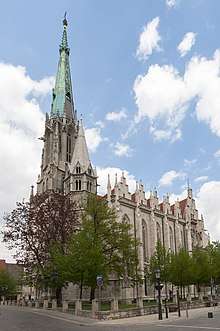St. Mary's Church, Mühlhausen
St. Mary's Church (German: Marienkirche) in the town of Mühlhausen, central Germany, is the second-largest church building in Thuringia after Erfurt Cathedral. Being principally constructed in the 14th century, it is considered a masterpiece of the Gothic style. The church's central spire, at 86.7 m (284 ft 5 in) height, is the highest in the state and forms a significant feature of the town's skyline. St. Mary's was a centre of the 1525 German Peasants' War, since the revolutionary leader Thomas Müntzer was active as a pastor at the church.
 St. Mary's Church, looking northeast
St. Mary's Church, looking northeast Central and northwest spire
Central and northwest spire- The southern portal and main entrance to the church
- Interior view
| St. Mary's Church | |
|---|---|
Marienkirche (German) | |
St. Mary's Church seen from the Raven's Tower, facing east | |
 St. Mary's Church Location in Germany | |
| Location | Mühlhausen, Thuringia |
| Country | Germany |
| Denomination | Lutheran |
| Previous denomination | Roman Catholic |
| History | |
| Status | Church |
| Founded | Middle Ages |
| Dedication | St. Mary |
| Associated people | Thomas Müntzer |
| Architecture | |
| Functional status | Museum (since 1975) |
| Architectural type | Hall church |
| Style | Gothic |
| Years built | 14th century |
| Groundbreaking | 1317 |
| Specifications | |
| Number of spires | 3 |
| Spire height | 86.7 m (284 ft 5 in) (central spire), about 42 m (137 ft 10 in) (side spires) |
| Materials | Travertine |
| Bells | 3 |
| Tenor bell weight | 5.5 t (5.4 long tons) |
Building
The church is a five-naved, Gothic hall church made out of local travertine. The central nave is twice as wide as the side aisles. On the western end of the church are the three steeples: two side spires, roughly 42 m (137 ft 10 in) high, and the main, 86.7 m (284 ft 5 in) high central spire. The towers are octagonal, built on a square base and foundation. On the eastern side are three choirs, a large central choir flanked by two smaller ones. Typical of the Gothic style, the central choir is high and narrow. The northern side choir was a baptismal chapel dedicated to Saint Nicholas, while the sacristy was located under the southern one.
The interior is divided into four rows by five tall, narrow columns. In the Medieval period, the gallery housed a library (which was common for larger churches to have at the time). The transept is as wide as the central nave. The southern portal of the transept serves as the main entrance to the church and is typical of the Gothic style.
 Western portal
Western portal Northeastern portal
Northeastern portal- Madonna statue at the main portal
- The organ by Wilhelm Sauer
Bach family
Johann Sebastian Bach was employed at Divi Blasii, Mühlhausen's other main church in 1707–1708, and is also known to have performed at St. Mary's. His cantata Gott ist mein König was premiered in the church.[1]
Bach visited St. Mary's in 1735, when his son Johann Gottfried Bernhard Bach was appointed as organist.
References
Sources
- Aulepp, Rolf (1993). "Neues aus dem alten Mühlhausen. Gräber und Bodenfunde in der Marienkirche. Die eingerillten Fische an der Marienkirche, zwei Glaubenssymbole?". Mühlhäuser Beiträge (in German). Mühlhäuser Museen (Sonderheft 9): 52–59.
- Badstübner, Ernst (1989). Das alte Mühlhausen. Kunstgeschichte einer mittelalterlichen Stadt (in German). Leipzig: Koehler und Amelang. p. 205. ISBN 3-7338-0055-9.
- Dehio, Georg (2003). Handbuch der deutschen Kunstdenkmäler Thüringen (in German). München: Deutscher Kunstverlag. ISBN 3-422-03095-6.
- Richter, Christa (1990). "Die Marienkirche zu Mühlhausen". Mühlhäuser Beiträge (in German). Mühlhäuser Museen (Sonderheft 7).
External links

- St. Mary's Church, Müntzer Memorial on the town's website